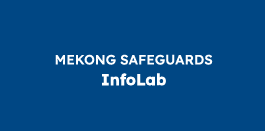USAID and Australia Strengthen Economic Resilience of Communities and People with Disabilities to Promote Sustainable Infrastructure Development
The Thai government aspires to develop world-class transport infrastructure, including the Thai-financed high-speed rail between Bangkok and Nakhon Ratchasima. However, research indicates that developers and authorities often do not consult communities and women-owned small businesses along the high-speed rail path who may face economic challenges from its development, including disruptions to livelihoods. Moreover, People with Disabilities (PWD) represent a particular disenfranchised segment of the population that is impacted by new transport infrastructure if its design doesn’t incorporate their needs, in particular accessibility.
To meet these challenges, the USAID and Australia Mekong Safeguards Program is working closely with local authorities to strengthen the economic resilience of communities, small and micro-business owners, and PWD groups along the rail’s development path, through capacity building that enables stakeholders to diversify income opportunities, establish community-based contingency funds, and develop social enterprises. This month, the Program organized an event to gather key community and government stakeholders to share progress and success stories and facilitate networks and interactions between the local communities and agencies that provide support and services relating to community livelihood and development.
When scaled up, this collaboration between Australia and the U.S. has the potential to benefit more than 200 households, and 500 women-owned microbusinesses, and 50 small businesses at risk of livelihood disruption from the high-speed rail development, strengthening the economic resilience of at-risk populations in Thailand’s communities in the path of large infrastructure developments.
Recent updates
-
USAID and Australia Strengthen Economic Resilience of Communities and People with Disabilities to Promote Sustainable Infrastructure Development
March 15, 2024 -
USAID and Australia Empower Communities in Northern Thailand to Mitigate Environmental and Social Impacts of Infrastructure Development
January 15, 2024 -
USAID and Australia Strengthen Environmental and Social Practices of a Major Commercial Bank in Thailand
November 15, 2023 -
USAID and Australia Strengthen Economic Resilience of Communities and Small Businesses to Mitigate Negative Impacts of Infrastructure Development
September 15, 2023




